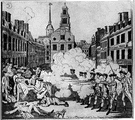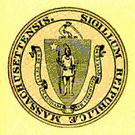The Making of the 50 States: Massachusetts
Part 2: The Rest of the Story As a British colony, Massachusetts naturally resented incursions on its trade from French and Native American forces. Massachusetts soldiers and sailors played a large role in the British victory in the French and Indian War, including the capture of the fortress at Louisbourg. With the end of that war, however, came the imposition of heavy taxes that, in large part, led to another war, the war of revolution. The Sugar Act placed a large tax on sugar and increased taxes on coffee, indigo, and certain kinds of wine. Massachusetts (and especially Boston), as a large manufacturing and trade center, was hit hard by the Sugar Act, and colonists were very vocal in their opposition to the new tax, eventually getting it repealed.
One response to the Tea Act was the Boston Tea Party, for which the British retaliated by passing the Intolerable Acts, one of which closed the port of Boston entirely. Boston was a hotbed of revolutionary activity, led by such famous Sons of Liberty as Samuel Adams and John Hancock. Another famous Bostonian, Paul Revere, went on a wild ride on the evening of April 19, 1775, announcing to the countryside that war was at hand. The first shots of the war were fired at Lexington and Concord. One of the first major battles of the Revolutionary War was the Battle of Bunker Hill, at which American forces held the British off until the last possible moment and inspired Patriots up and down the Atlantic Coast. Not long after the British "victory," American forces were again in command of Boston, a position that they would not relinquish for the length of the war.
Next page > The Rest of the Story > Page 1, 2 Graphics courtesy of ClipArt.com |
|
Social Studies for Kids
copyright 2002–2024
David White



 But other and more repressive taxes followed, including the
But other and more repressive taxes followed, including the  Soldiers and militiamen from Massachusetts fought elsewhere in the war and played an important part in the ultimate victory. After the brief interlude under the
Soldiers and militiamen from Massachusetts fought elsewhere in the war and played an important part in the ultimate victory. After the brief interlude under the 
